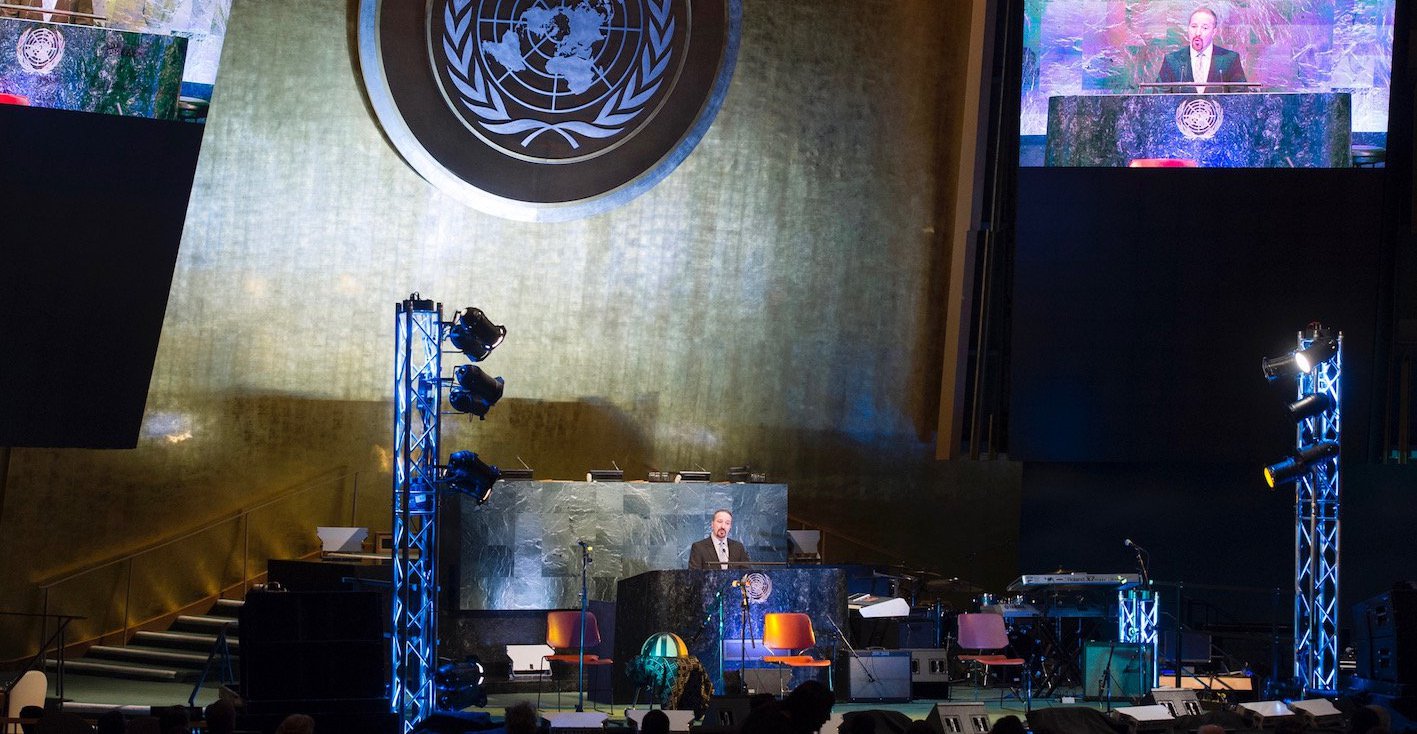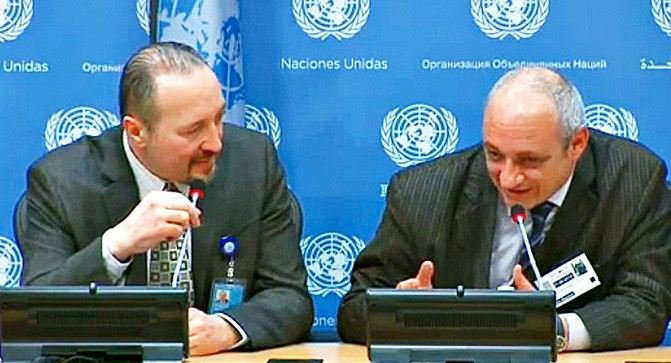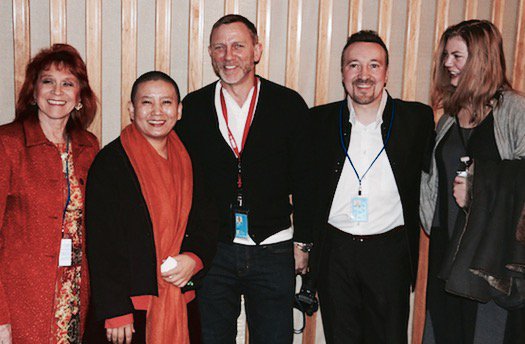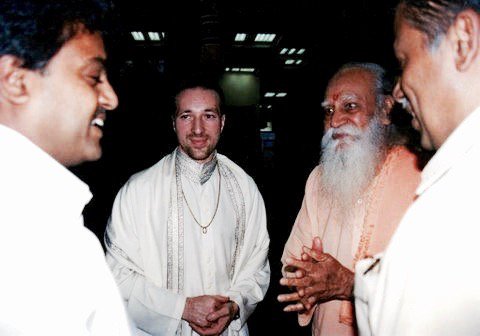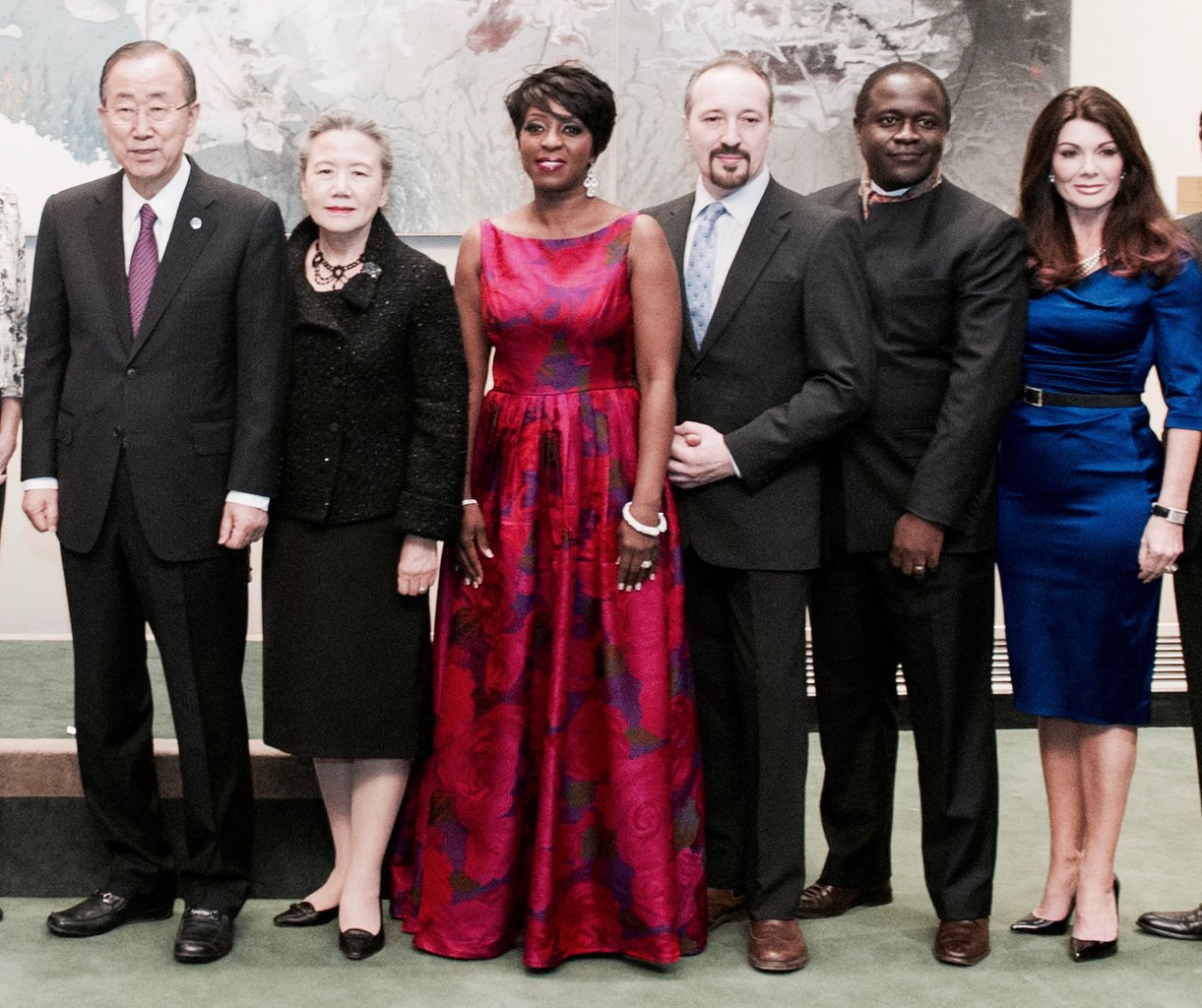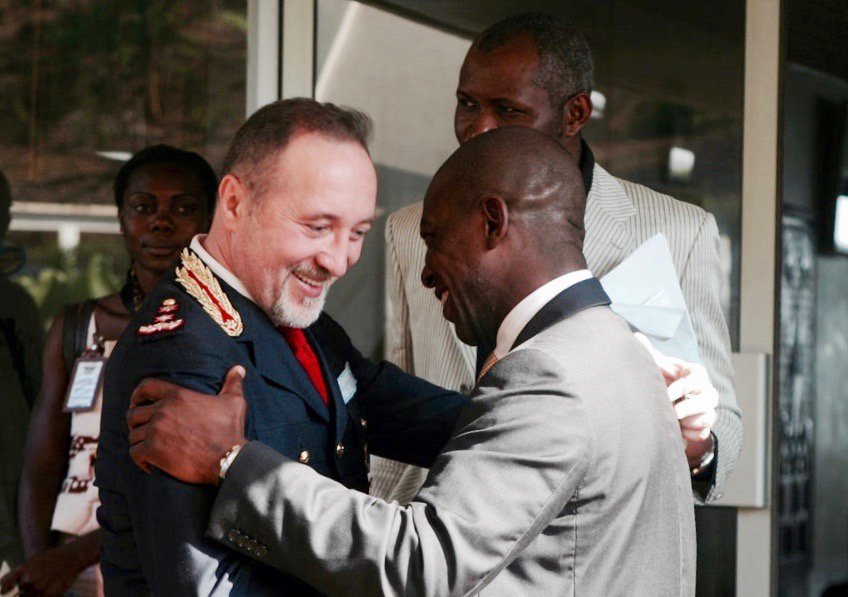Former United Nations ambassador for São Tomé and Príncipe, Italian citizen Angelo Antonio Toriello, and his assistant now face charges of drug trafficking and attempting to sell weapons to the mafia
Last year, both men tried to secure billions for a dodgy Ebola relief project in West Africa with a convicted money launderer for the Calabrian mob, the ‘ndrangheta
Toriello is former a Franciscan Friar, owner of a fake doctorate, and professional singer of Frank Sinatra and Dean Martin standards. He also organised a ‘Day of Happiness’ at the United Nations HQ - an event patronised by ‘007’ Daniel Craig
At around 4:30pm on 11 February 2017, a dark gray Audi A6 exits the motorway heading to northern Naples. The driver, a chubby 52-year-old man from Castellammare di Stabia, the coastal district in the south of the city, is nearing the end of his 1,800 km journey from the Netherlands, the latest in a series trips he has taken in the last few months.
This will be his last for a while.
Police from the Guardia di Finanza, lying in wait just beyond the toll booth, ‘randomly' pull the car over. Even with the windows closed, the stench of cannabis from the car is so overwhelming that they do not need sniffer dogs, they said later. In the boot, packed inside several large holdalls, is 50 kg of hashish and ‘amnesia’ marijuana, a strain with intense psychotropic effects.
Panicked, the man pulls an ID card from his pocket and hands it to the cops. It shows ‘diplomatic immunity,’ a protection that he believes prevents his arrest. On the document is a picture and a name: Sebastiano Lauritano.
Lauritano, it states, works as a coordinator for His Eminence Angelo Antonio Toriello, another Italian national and the deputy ambassador to the UN for São Tomé and Príncipe, a two-island West African state and former Portuguese slave colony, with a population of around 200,000.
Lauritano's ‘Get Out of Jail Free’ card fails. The police arrest and charge him with drug trafficking.
In comments to an Italian newspaper at the time, Ambassador Toriello publicly denies that Lauritano was ever working for him, saying "I have never accredited [Lauritano] with any positions or functions at my diplomatic office."
This is a lie.
Here is a picture of the pair launching a project in a press conference in the United Nations:
In less than five months, Toriello will join his coordinator in jail.
Toriello and Lauritano today face charges of drug trafficking for Naples-based mafia the Camorra, whose influence and narcotics operation stretches from Europe to Morocco, Ecuador and, it seems, São Tomé and Príncipe.
Police documents, obtained by The Black Sea and the Investigative Reporting Project Italy (IRPI.eu), cites additional evidence suggesting that the diplomat and his accomplice attempted to exploit Toriello’s ambassadorial position to traffic cocaine from Ecuador to Europe in diplomatic suitcases. The files also suggest the pair also discussed selling the Camorra weapons belonging to São Toméan government.
Wiretapped conversations between this pair imply that Lauritano - through his mafia connections - orchestrated Toriello’s appointment as São Tomé and Príncipe’s United Nations representative, and paid his own boss 5,000 Euro per month.
Lauritano’s arrest was not serendipitous, it emerges. For several months, the police had him and a cadre of alleged conspirators under surveillance, tapping his phones and installing listening devices in his car. They were gathering evidence as part of 'Operation Santa Lucia', a transnational investigation started in late 2015 by Spanish and Italian police designed to disrupt into the Camorra’s European drug smuggling and money laundering activities.
On 5 July, police launched a series of raids in Italy, Spain, and Germany, arresting over thirty people and seizing cocaine and marijuana. They confiscated at least €5 million in business assets, among them two posh restaurants and a car import-export service, in Barcelona; a luxury jewellery shop, and a football agency in London; a car dealership in Portugal, and two more dealerships in southern Germany.
Lauritano had fallen under the dragnet six months earlier over contacts with influential members of the Polverino, Puccinelli and Contini, three powerful clans of the Camorra from Naples.
From Lauritano, they got to Toriello. They learned that these two men are not ordinary drug trafficking suspects.
‘Clap along if you feel like happiness is the truth’
On 20 March, 2016, Ambassador Toriello is the cheerleader for the United Nations ‘Day of Happiness’, a 12-hour marathon of fun at the New York headquarters of the UN, run through his initiative ‘Humanicy,’ which aims to bring ‘a human side’ to diplomacy.
Representatives of world leaders bounce and hug inflatable globes, listen to sacred chants from a Buddhist monk, and Chinese instrumentalists play a version of Pharrell Williams’ anthem to joy, ‘Happy’.
One highlight is when Toriello himself spontaneously breaks into song, belting out a Dean Martin hit from 1953. “When the world seems to shine like you've had too much wine, that's a-mor-aaay," he serenades.
He is greeted with grand applause. But the assembled dignitaries are seemingly unaware of Toriello’s past, his dodgy connections, bizarre pseudo-scientific experiments and fake qualifications.
Crooner, Catholic Friar and Fake Doctor
Toriello was born in France to Italian parents in October 1962. The family moved to Mercato San Severino, a small town in the south of Italy, between Salerno and Naples. He spent much of his youth following a religious calling with the Franciscan Order. While there he says he was sexually abused by priests. Later he was was forced out of the monastery when he opened a hotline for victims.
Since then, he frittered from one venture to another, racking up a history as bar owner, ‘investigative journalist’, showman, founder of holistic religious groups, scientist, and a researcher devoted to helping grieving parents speak to their dead children.
For a while, Emanuel Toriello, as he is also known, still enjoyed his persona as the singing Franciscan Friar, bringing his religious message to the forgotten corners of the earth, while crooning classics, such as ‘Are You Lonesome Tonight?’ and ‘My Way’.
Despite his obvious lack of expertise, in May 2012, Toriello was appointed as São Tomé and Príncipe’s representative for the West African republic's first diplomatic mission to the United Nations in New York.
The country’s then 74 year old President Manuel Pinto De Costa installed Toriello by signing a secret decree three months earlier, bypassing the nomination hearings in the parliament that might have provided answers as to how a white, Italian-French national, with no prior diplomatic or political experience, and no Portuguese language skills, could end up in such high office.
Toriello appears to have relished the spotlight the role offered. He became fond of calling himself a doctor, and claimed to have a ‘scientific background’. His website, paradoxxmedia.net, cites a PhD in Philosophy of Criminology and a Master of Laws (LLM). But his master's degree is fictional, bought from the Dublin Metropolitan University (DMU), a ‘diploma mill’ run by a convicted embezzler, which was closed down a few years after Toriello’s graduation, for selling worthless degrees, mostly to foreigners. Similarly, the University of Hartford in the U.S., where Toriello claims to have earned his doctorate in early 1980s, denies ever running a “distance learning” Philosophy of Criminology PhD and there is no public record of Toriello graduating there.
The new ambassador also began hiring Italian friends in key roles; friends like Sebastiano Lauritano.
On 30 February 2015, Toriello launched his biggest project in the UN: the ‘Stop Ebola and Build for the Future’ concert to raise global awareness of the Ebola Virus, which had killed tens of thousands of West Africans.
The concert was hosted at the UN General Assembly and was preceded with a speech by Secretary General Ban Ki-Moon, who thanked the mission of São Tomé and Príncipe and urged citizens to pledge financial support to defeat Ebola.
At a press conference before the event, Toriello had a big announcement. His mission, he said, had orchestrated a $2.5 billion dollar aid project to fund hospitals, health facilities, equipment, housing, infrastructure, and start-up activities for locals in West African countries hit hard by the Ebola epidemic.
To explain the mechanics of the initiative to the few attendees, he brought out Lauritano, whom he called a doctor, and invited him to explain the science behind the virus. Lauritano, The Black Sea subsequently learned, holds no medical qualifications. His degree in homeopathy is not formally recognised, having been granted by the since-closed Clayton College of Natural Health in Alabama, a non-accredited, distance-learning college specialising in ‘alternative medicine’.
This mattered little. Toriello ploughed ahead. The Ebola project, he said, was to be financed by the World Bank and UN, and the multi-billion-dollar contract would be awarded to a Nevada-based company, called the Pintus Group.
We investigated Pintus Group, and found that man behind the company is another Italian, Curio Pintus, a convicted money launderer who in the 1990s shifted half a billion dollars of narco-cash belonging to the Calabria-based mafia group, ‘ndrangheta. After spending three years in prison in Italy, Pintus moved his operations to the U.S. Our investigation also exposed how Lauritano and Toriello conspired to hand the lucrative contract to Pintus without any public tender - a move that later forced the UN to kill the initiative.
While researching the story, we met with Toriello during the Christmas holidays of 2015 at a restaurant in London. This was a location was “pre-approved” by his security team, the Italian claimed.
Dressed in a light grey suit and with a fading, silver hairline, the ambassador peppered the conversation with grandiose statements about his life and career, often with a false humility. But for most of the two-hour interview, Toriello was reluctant to divulge any information about the deal or release a copy of the contract with Pintus. He was only willing to hand it over if we could arrange money. This was necessary, he said, because revealing the truth would result in his dismissal as ambassador, a role he claimed to undertake for free. "I have a family to think of," he told the journalist.
In the summer last year, the authors published their "Mafia in Africa" report into how Toriello and his associates had attempted to involve mafia figures in UN business. Toriello sued.
Diplomats Go Rogue
The failure of the Ebola initiative appeared to have no affect on Toriello’s standing with the São Toméan government, and both he and his assistant continued in their diplomatic roles. But in late August last year, Manuel Pinto da Costa, the sitting president, lost the São Tomé and Príncipe election and left office. As is the custom, his diplomats and cabinet ministers departed with him.
Around this time, the Italian police probe began an investigation into Toriello's connections to the Mob and their potential involvement in criminal activities, such as trying to use a diplomatic cover to smuggle cocaine. Transcripts of police wiretaps of conversations between Lauritano and Toriello paint a picture of the duo as smugglers who were well connected, but incompetent.
One of their conversations, which allegedly took place in November, months after Toriello is supposed to have left his post, is cocaine. Specifically, the transport of up to 120 kilos from Ecuador to Europe in league with the Camorra. According to the files, on 17 November, Lauritano travels to Ecuador for a five-day trip to set up the deal, staying first in the country’s capital, Quito, and then the small, southern town of Santa Rosa. At this stage, Toriello stays away.
The plan, worked out between Toriello and the Camorra brokers, is to hide between 70 and 120 kilos of coke in his ‘diplomatic suitcases’. This is luggage, designed and adapted with sheets of lead to hide the illicit contents, will allow Toriello to waltz the wares through customs and bypass the security gates, flashing his ‘diplomatic immunity’ as proof he is untouchable.
The deal soon begins to crumble. The Camorra buyers no longer want to commit to such a heavy load. Instead, they ask for 30 kilos, and agree to pay €500,000. The Colombians are unhappy, but agree to the deal: the cocaine will be delivered by the 27 November, they say.
On Monday, the 21st, Lauritano flies home to Italy and waits. He complains to 44-year old Cristian Neri, a drug broker for the Camorra and one of the architects of the plan, that they “must give me [the] 500,000 Euro” fee originally agreed, regardless of the shipment size.
For over a week the cocaine sits in an apartment in Quito, waiting for Toriello to come to Ecuador and collect it. Now, the Camorra are not happy - and Neri begins to threaten Lauritano.
Ten days later, on 7 December, Lauritano and Toriello discuss the deal. Instead of half a million, the pair will agree to a €240,000 payment, if Toriello can fly to Ecuador before Christmas and fly the coke out in a smaller “diplomatic briefcase”. But it is not so simple, Toriello complains. His travel is determined by the São Toméan UN mission, and so can’t be scheduled at the time he wants.
In the end, Toriello never makes the trip and the deal falls apart, leaving Lauritano owing €50k to the Camorra.
If Toriello ever really planned to make the trip, the affair raises questions about how he could have smuggles the cocaine using a ‘diplomatic cover’ he supposedly lost months earlier, when he lost his job.
Alcínio Cravid e Silva, the new chief of staff for the São Toméan Foreign Ministry, and main contact for UN diplomatic services, told The Black Sea that he believes Toriello lost his official credentials when he was fired in August last year, when the new president came into power.
The Italian police believe he retained some ambassadorial benefits, but could not provide evidence. Neither e Silva nor the country’s new Foreign Minister, Urbino Botelho, gave an official date of Toriello’s departure, and they could not answer how he and Lauritano remained able to advertise their diplomatic status to the Camorra for international drug deals, which they doing at the time.
New Venture: Handguns for the Mafia
As the cocaine deal was falling apart in December, Toriello heard the Camorra were after some weaponry. He has another money-making idea. According to wiretaps, Toriello pushed Lauritano to offer two men from the Camorra, named the ‘Two Gennys’, "big quantities" of weapons he has for sale: specifically, up to 15 kits made up of 7mm Penna handguns, ammunition, and vests. The cost: €70,000 per kit.
“You have to tell [the contact] that the delivery times have to be flexible,” Toriello says on tape. “The delivery time could be one week or 45 days,” he adds, before explaining that the “merchandise” would be bought and “sent to the government” first, and then to Toriello. The guns will be clean, says Toriello, because they will come from the government of São Tomé.
São Toméan officials would not respond to questions about how one of its diplomats allegedly offered to sell their weapons to a violent mafia group.
Though the two Italians' illicit deal failed, they had a third crack at the big time: a consignment of nearly a tonne of marijuana and hashish from Morocco.The buyer in the deal is, once again, the Camorra of Naples, and the middleman, Cristan Neri.
Early on in the discussions, according to the wiretaps, the gang’s drug contact in Morocco says they can go as high as 30 tonnes per deal. This time, however, they are only prepared to sell 900 kilo, as a test.
On 16 December, Lauritano contacts the supplier about the shipment. “We need to move this 900 kilos... as soon as we can,” he says. “For the payment,” he adds, “does [your Moroccan partner] agree to receive the first half at the beginning and the second one at the end?” Apparently, the partner is against splitting the fee.
Instead, over the next months, Lauritano acts as a mule for the two Gennys, who run a monopoly on the sale of ‘amnésia’ marijuana in Naples. He transports the goods from a loft in Amsterdam back to Naples by car. Sometimes Toriello joins him for the ride.
Toriello appears less than committed to the trafficking cause, however. During a drug run from the Netherlands, he complains about his financial difficulties and family problems. He tells Lauritano he must go back and deliver €2,000 to his wife and two children, who live in London.
Secret of Dodgy Appointment Revealed
The wiretap evidence collected in these months also shed light on how Toriello, an Italian lacking any political experience, and with fake degrees and legal troubles, could have been installed as senior diplomat for a country he had never even visited.
Lauritano, it seems, was a key player in this charade. Toriello gets a monthly fee of €5,000, and, in return, the former Franciscan Friar hires Lauritano as his coordinator.
Speaking with Cristian Neri, the drug broker, on 16 December 2016, Toriello said that he is in "a project" with Lauritano, and that the two of them play their roles. “Do you know why I have a diplomatic rank?” Toriello says. “I tell you the truth. [Lauritano] had to hold it, but he let me hold it."
It is during one of these routine drug runs from the Netherlands that Lauritano is grabbed by the police and arrested. He has been in jail since.
Toriello’s activities over the next few months are unknown. Police say that he continued traveling on diplomatic missions for São Tomé and Príncipe, but there is no evidence of this. The shameless self-promoter remains quiet. It is believed he is staying with his family in London.
At the beginning of July, Toriello takes a flight from the UK to Italy to visit his parents in Mercato San Severino. The move surprised the police, who told us that with Lauritano in jail and talking to the cops, they assumed Toriello would not enter Italy and risk his freedom.
When the ‘Operation Santa Lucia’ raids are carried out across Europe on 5 July, Toriello is among those arrested, grabbed at his parents’ home. Among his possessions they find his identification card for the UN headquarters in New York, a symbol of Toriello’s four years at the table of the hub of global diplomacy.
One big question remains unanswered: was he invited by a president, the mob, or both?
